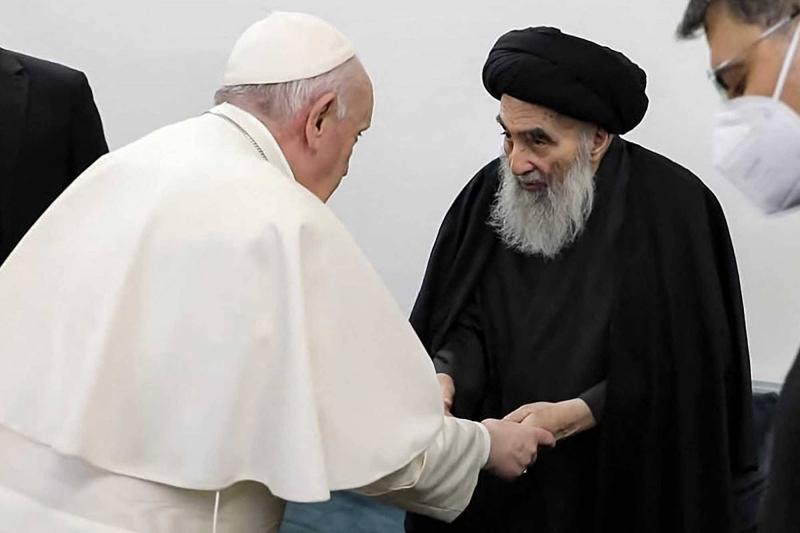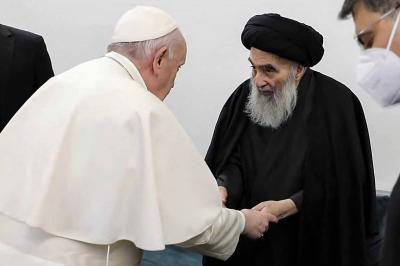There are reports about the death of the highest Shia religious figure, Sayyid Ali Al-Sistani, following news about his declining health and his admission to Al-Kafeel Hospital in Iraq. Al-Sistani's media office issued a statement denying the news of his death, stating that what has been published is nothing but false and inaccurate, and that he is well and in good health.
**Who is Al-Sistani?**
He is one of the largest religious authorities for Shia Muslims in Iraq and the world, succeeding Abu Al-Qasim Al-Khoei in leadership of the religious authority in Najaf. He is of Iranian descent.
**His Early Life**
Al-Sistani was born in 1930 in the city of Mashhad, Iran, and was named Ali in honor of Imam Ali ibn Abi Talib. His full name is Ali bin Muhammad Baqir bin Ali Al-Husseini Al-Sistani, and his nickname "Al-Sistani" refers to the Sistan province in Iran. He moved to Qom, Iran, in 1949 to continue his religious studies. In 1951, he emigrated to Najaf, Iraq, where he received his ijtihad license from his teachers, Ayatollah Abu Al-Qasim Al-Khoei and Ayatollah Hussein Al-Hilli.
In the later years of Ayatollah Al-Khoei's life, the search for his successor was a concern for Shia figures in Najaf and beyond. Ayatollah Al-Khoei then chose Al-Sistani to lead prayers in his place at Al-Khadra Mosque, leading to Al-Sistani's rising popularity among the public after being primarily known in academic and religious circles. After Al-Khoei passed away in 1992, Ayatollah Al-Sistani took on the responsibilities of religious authority and leadership of the religious seminary by issuing licenses, distributing funds, and teaching at the pulpit of Imam Al-Khoei at Al-Khadra Mosque.
**His Writings**
Al-Sistani has authored a large number of books, including notable works such as "Sharh Al-Urwah Al-Wuthqa," a commentary on the book "Al-Urwah Al-Wuthqa" by Muhammad Kazem Al-Tabatabai Al-Yazdi, "Minhaj Al-Salihin," "Al-Buhuth Al-Usuliyyah," and "Risalah fi Al-Taqiyyah," among others.
**Political Positions**
Those close to Al-Sistani claim that he refused to engage in any political activities during the regime of former Iraqi President Saddam Hussein, leading to Hussein placing Al-Sistani under house arrest due to his exhaustion from the Iran-Iraq War. Despite his supporters claiming his distance from politics, he supported the United Iraqi Alliance, which was primarily comprised of the Supreme Islamic Council of Iraq and its allies, significantly bolstering this coalition in the first Iraqi elections after the fall of Saddam Hussein's regime.
His opponents accuse him of supporting the American-led project in Iraq, arguing that he did not issue a fatwa calling upon the millions of followers in Iraq to participate in armed resistance that began after Baghdad fell under American occupation on April 9, 2003, justifying that the conditions were not right for such a fatwa at that time.
Al-Sistani sent a message to the Iraqi people urging them to navigate this challenging period without falling into the traps of sectarian and ethnic strife and called on the government to move beyond its conflicts and not to govern based on sectarian or ethnic lines in order to restore full sovereignty to the Iraqi people.
In July 2014, after ISIS took control of Mosul and other Iraqi cities, Al-Sistani issued a fatwa calling for jihad against ISIS, urging Iraqis to bear arms and fight the "terrorists," which led thousands to volunteer for military training. This raised concerns among various parties in Iraq regarding the potential interpretation of this fatwa as being directed against Sunnis in the country.




